
Developing strong, cornerstone content is one of the most important things you can do when trying to expand your audience, customer base and business online. Not only does great content help you attract high-quality target audience members and establish a foundation of trust, but it also contributes to your SEO strategy. When you have a strong and successful SEO plan, you can consistently bring new attention to your business.
However, at the very base of your SEO strategy and your content should be your cornerstone pieces. As the foundation to your digital marketing, you need to put the appropriate amount of time, research and effort into developing the right pieces of cornerstone content for your business.
To help you get started, let’s take a look at the basics of cornerstone content and what you need to include to ensure it helps your business take off.
What is Cornerstone Content?
If you’re running an online website, you probably have a lot of content. While we want each piece we upload to be as thorough and complete as possible, it is only natural that you will feel more proud of certain pieces than others. Your cornerstone content will be the pieces that you believe most accurately represents your brand.
Typically, you should have about four or five pieces of content that you consider “cornerstone.” These pieces should work together to accurately cover your brand’s values, what you can accomplish and how you can help your customer. They will also be used as the foundation of your SEO and online marketing.
Let’s take a look at ten things you’ll want to include in your cornerstone content to increase your chances of ranking highly.
1. Create Your Post as a “Page”
Your cornerstone content isn’t like any other blog, so it shouldn’t be treated the same. Because it is more important to your website than other content you’re uploading, you should consider creating it as a Page rather than a Post.
Of course, the taxonomy matters most if you use WordPress, but this also helps shape the way you think about this page. Even if you don’t use WordPress, thinking of the cornerstone piece as an important page of your site elevates its importance and makes you more likely to link to it from relevant places in the future. You may also be more inclined to update it frequently, and by keeping the content fresh you are further demonstrating that page’s importance within your site’s hierarchy to Google.
2. Target Competitive Keywords
In a way, your cornerstone content acts like an introduction to all other content you create. As a broad image of what you can provide, this means your keywords will be more basic and competitive. However, because all your other content will fall under your cornerstone content, you can improve your ranking and get more attention.
Your cornerstone content should target the most competitive keywords on your list. Your other content will then get more specific with keywords, using long-tail related phrases where appropriate.
3. Develop Long-Form Content
Your cornerstone content needs to cover all your bases, so it’s going to need to be long and in-depth. Ideally, your visitor will go straight to your cornerstone content when they reach your site. This means you want to give them as much information as possible without overwhelming them.
Plot out your cornerstone content so that you can go long and broad. Give a solid introduction, but link out to other content for more information whenever you can.
4. Include High-Quality Images
Images help to break up your content so it is easier to read and grasp. Having images within your posts also allows you to rank within the image section of search. Properly optimizing your images allows you to attract new attention to your content.
You should include some high-quality images within your cornerstone content. This can include more than just pictures, such as screenshots, infographics and graphs. Be sure you’re featuring some relevant images to help your reader grasp the material.
5. Develop a Strong CTA
When your reader gets done going through your cornerstone content, it needs to be clear what you expect them to do. Whether it’s move on to other content, reach out to your brand or even make a purchase, you need to clearly define your expectations with a call to action.
Your call to action needs to be strong, but it also needs to be realistic. Think about what the next step may be after a visitor finishes a piece of cornerstone content and give them a nudge in that direction.
6. Optimize Your Title Tags and Headlines
Your title tags and headlines will be some of the first pieces a search engine crawler will scan through when determining whether or not your content meets the needs of the search. This means that you’ll want to have them properly optimized to get the crawler’s attention.
Include your keywords within the title tags and headlines of your cornerstone content. This will improve your chances of getting noticed in an search engine search.
7. Push to Related Content
Because your cornerstone content should act as an introduction to the rest of what you can offer, you want to push out to relevant content. This web of internal links allows you to push both readers and search engine crawlers to other pieces of content that may fit their needs.
Remember to keep your cornerstone content broad. Use internal linking to another post to get deeper if necessary.
8. Create Links in Other Posts
Just like you want to link to other pieces of content within your cornerstone content, you want to include links back to your cornerstone content as well. These links can bring readers back to the basics if they need an update.
Make sure all your links are relevant and appropriate. Use high-quality keywords as your anchor text to get even more SEO attention.
9. Update the Post Frequently
Your cornerstone content needs to be evergreen, which may mean it needs some updating from time to time. Depending on the topics you cover within your cornerstone content, you may need to revamp them to ensure they’re still accurate and relevant.
Create a schedule where you comb through your cornerstone content and update as needed. Making small changes periodically will allow you to save time.
10. Encourage Backlinks
To show search engines that you’re providing a quality piece of content, you want other websites to link back to your cornerstone content. While providing high-quality content can help you do this naturally, you may also need to reach out to website owners to ask them to include a link to your page.
Look for relevant content and simply send a message asking if they’d be willing to include your link in their content.
* Adapted lead image: Public Domain, pixabay.com via getstencil.com
The post Checklist For Creating Powerful Cornerstone Content appeared first on Search Engine People Blog.
(93)
Report Post





